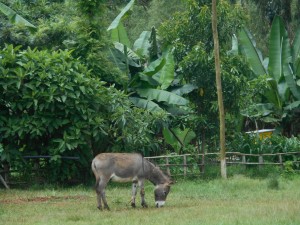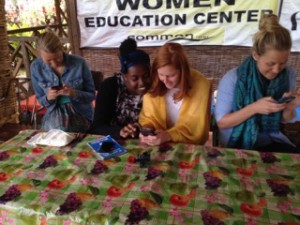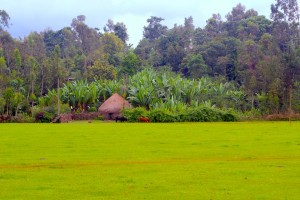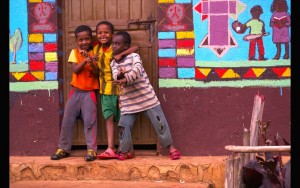It has been 11 years since I’ve stepped foot in Ethiopia, yet every day I am reminded of this country. The day I arrived in Ethiopia was one of the most exciting moments of my life. As soon as I landed and stepped out of the airport I was greeted by uncles and cousins that I had not seen in over a decade. One of the first things I noticed about Ethiopia is that it has drastically changed. There were skyscrapers on almost every block in the capital city, and it seemed as if  the amount of people that lived in the city was multiplied by ten! There were so many cars, people, buildings and traffic. For a moment I thought I may have landed in the wrong country. Over the last ten years, Ethiopia has industrialized extensively then I had ever imagined. Nevertheless, although Addis Ababa is now known as the capital of Africa, there were still moments of the old Ethiopia such as cows, goats and sheep running around the city. I also noticed that the only means of “fast food” in the country included grilled corn, or steamed potatoes and samosas on the side of the road. After spending a night in the capital city, Addis Ababa, I began my journey to start my 10 week internship in Aleta Wondo five hours south of the capital.
the amount of people that lived in the city was multiplied by ten! There were so many cars, people, buildings and traffic. For a moment I thought I may have landed in the wrong country. Over the last ten years, Ethiopia has industrialized extensively then I had ever imagined. Nevertheless, although Addis Ababa is now known as the capital of Africa, there were still moments of the old Ethiopia such as cows, goats and sheep running around the city. I also noticed that the only means of “fast food” in the country included grilled corn, or steamed potatoes and samosas on the side of the road. After spending a night in the capital city, Addis Ababa, I began my journey to start my 10 week internship in Aleta Wondo five hours south of the capital.
The journey to Aleta Wondo was not an easy journey, mostly because the roads are not completely paved yet, so the car ride was extremely jerky. Upon entering the Common River gates I was mesmerized, it was like I had walked into a tropical garden. My experience  interning with Common River has been nothing but enjoyable. All of the faculty and staff on site were always there to help me in anything I needed, and I was able to get a long a create meaningful relationships with all the other international volunteers. In my internship with Common River I completed an ethnographic study of the Sidama tribe in Southern Ethiopia. Throughout my three months in Aleta Wondo, I completed a number of different interviews with the local Sidama people learning about all the different aspects of Sidama culture, including their cultural foods, dance, clothes and I even had the opportunity to participate in the Sidama new year. It was amazing to see how the people of Sidama value their religion. Through my internship in Aleta Wondo I was able to see how much the Apostolic movement has influenced the city. There were church conferences almost every weekend in neighboring towns, in which thousands of people would gather to church. While in Aleta Wondo I also had the chance to explore the city. Aleta Wondo is one of the most beautiful cities I have ever experienced because of its exquisite natural scenery. Aleta Wondo is a sub-tropical area so there
interning with Common River has been nothing but enjoyable. All of the faculty and staff on site were always there to help me in anything I needed, and I was able to get a long a create meaningful relationships with all the other international volunteers. In my internship with Common River I completed an ethnographic study of the Sidama tribe in Southern Ethiopia. Throughout my three months in Aleta Wondo, I completed a number of different interviews with the local Sidama people learning about all the different aspects of Sidama culture, including their cultural foods, dance, clothes and I even had the opportunity to participate in the Sidama new year. It was amazing to see how the people of Sidama value their religion. Through my internship in Aleta Wondo I was able to see how much the Apostolic movement has influenced the city. There were church conferences almost every weekend in neighboring towns, in which thousands of people would gather to church. While in Aleta Wondo I also had the chance to explore the city. Aleta Wondo is one of the most beautiful cities I have ever experienced because of its exquisite natural scenery. Aleta Wondo is a sub-tropical area so there  were several avocado trees, coffee trees, passion fruit, pineapples and more on almost every corner of each street. I also had the opportunity to help teach an English class for students in primary school. Because I come from an Ethiopian background myself and speak the national language, Amharic I was able to efficiently help teach and translate during English lessons with some of the other international volunteers. Although Aleta Wondo was an extremely beautiful city, it was also a city struggling to cope with poverty like many other cities in Ethiopia. Poverty and hunger are serious issues that the beautiful city of Aleta Wondo is still battling, allowing me to truly appreciate the beauty and nature of this city. There were many things that I have learned through this trip but one thing that I am most grateful for from this adventure is the relationships I have created. From the staff and faculty that work at Common River as well as all the students and parents I was able to work with, I will forever be grateful for these relationships I have made and cannot wait to reunite in the coming years.
were several avocado trees, coffee trees, passion fruit, pineapples and more on almost every corner of each street. I also had the opportunity to help teach an English class for students in primary school. Because I come from an Ethiopian background myself and speak the national language, Amharic I was able to efficiently help teach and translate during English lessons with some of the other international volunteers. Although Aleta Wondo was an extremely beautiful city, it was also a city struggling to cope with poverty like many other cities in Ethiopia. Poverty and hunger are serious issues that the beautiful city of Aleta Wondo is still battling, allowing me to truly appreciate the beauty and nature of this city. There were many things that I have learned through this trip but one thing that I am most grateful for from this adventure is the relationships I have created. From the staff and faculty that work at Common River as well as all the students and parents I was able to work with, I will forever be grateful for these relationships I have made and cannot wait to reunite in the coming years.  -Ruhama Dimboré, Summer 2016
-Ruhama Dimboré, Summer 2016